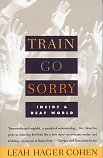Cohen's grandparents were deaf, and her father was the superintendent at New York's Lexington School for the Deaf, and she herself has worked as an ASL interpreter. So this is an account of the world of the Deaf, told by someone who, although an outsider to that culture, is about as close to being an insider as it is possible for a hearing person to be.
The stories are alternately harrowing and uplifting. They cover the history of her family, of the use of sign language, of the school, and of some of its students. We get a fascinating insight into the grammar of ASL as Cohen starts to learn it seriously.
"Where's the water fountain?" he queried.
It was near. I pointed in the general direction of the hall. He showed me how to make it precise: eyes narrowed, lips pressed tightly against teeth, shoulder raised, chin tucked in, wrist near body as one finger traced a tight angle --- "just around the corner to the right."
The main thread running through the book is the argument about "mainstreaming" versus Deaf culture. Should deaf children be assimilated into the hearing world, or be brought up in the world of the Deaf? Cohen describes the two fairly polarised perspectives. The arguments for mainstreaming are based on the way exclusion turns handicapped people into second class citizens, and that lack of English would further exclude them from majority culture. The arguments for segregation are linguistic and cultural: it is essential to have a rich linguistic culture, and the only way for deaf children to get that is in a signing world -- they simply can't get a rich enough experience otherwise, because of the lack of "secondary" input, of overhearing conversations, and so on.
It sounds like one of those questions that has no right answer. But to my mind, deliberately stopping someone using the most natural form of communication available to them, and forcing them to use an almost impossible, unnatural, impoverishing form, just because that would make them more "normal", strikes me as deeply horrific.
